How to Build an ERP System: an Ultimate Guide
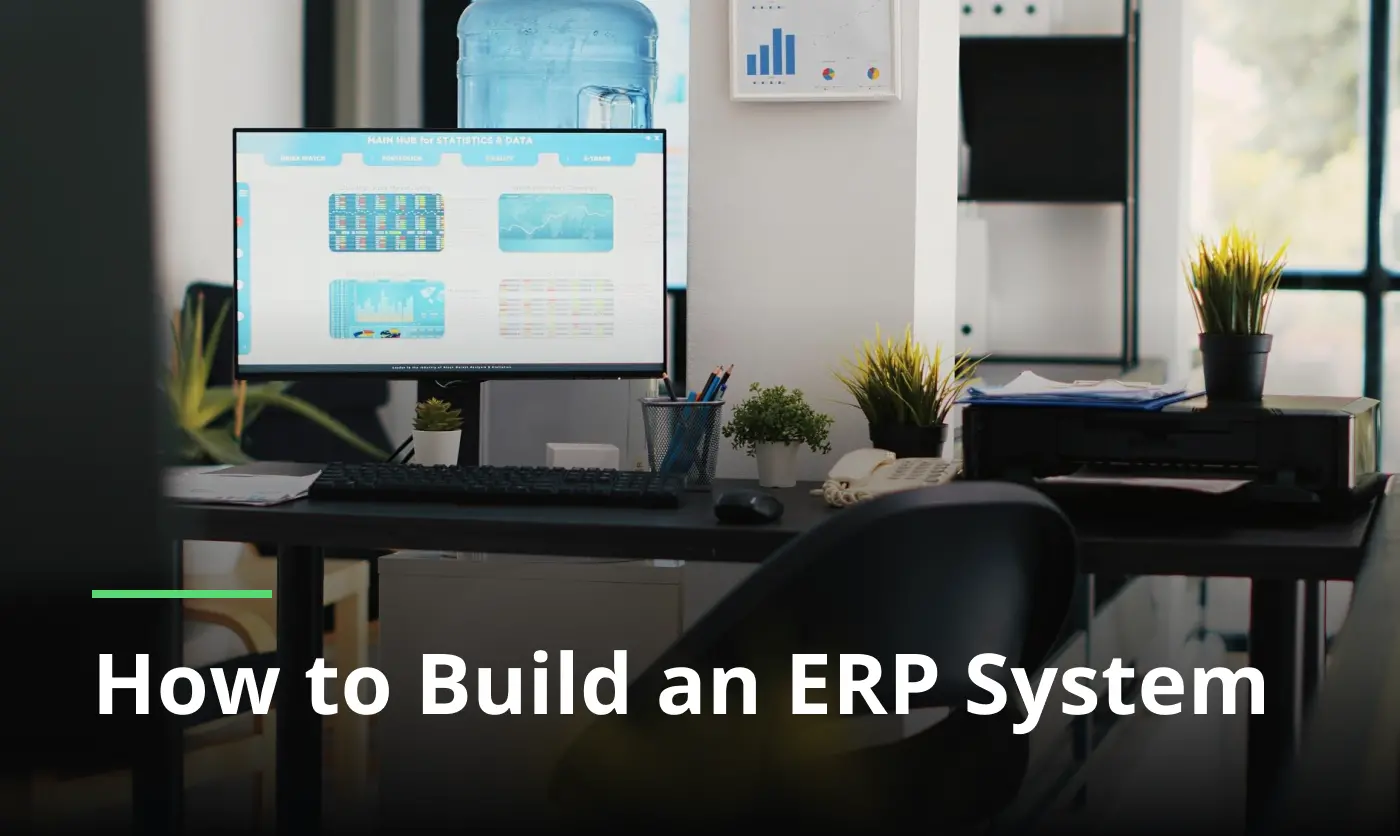
Custom ERP software development is an ace up your sleeve for enhanced efficiency, decision-making procedure, cost savings, customer satisfaction, and other vital points that influence your success. As it sounds like rocket science, we will review this topic from the perspective of a non-tech-savvy business owner or representative.
Since ERP system development is aimed at streamlining all the operations related to inventory management, accounting, finances, risk mitigation and more, it’s a brass ring for firms that would like to receive more advantages from daily, manual tasks. In this article, we will consider how to build such a solution, expenses, timeframes, and core features.
If you have ever wondered about what is needed to build ERP software, we have got you covered, leveraging our 10+ years of experience in the IT industry and collaborations with customers seeking the same platforms, so you are able to apply for our software development services and get the ball rolling.
What is ERP software development?
Manual work has limits, and when they are reached, there are no opportunities to handle all the workload of risk and project management, staff, productivity, accounting, and other points that are specific to your niche.
Here, ERP systems development becomes an open sesame for concerns that would like to receive real-time access to the primary part of vital processes, give free hands in daily tasks and prioritization, reduce the possibility of human errors, use one program for all departments, even HR.
Implemented correctly, such a solution will bring into play long-term benefits, which include better ROI, productivity, boosted optimization. We would also like to note that based on our background, you may want to invest time and money in employee training and be able to conduct upfront investment, that’s why such progress is profitable for enterprises and fast-scaling organizations.
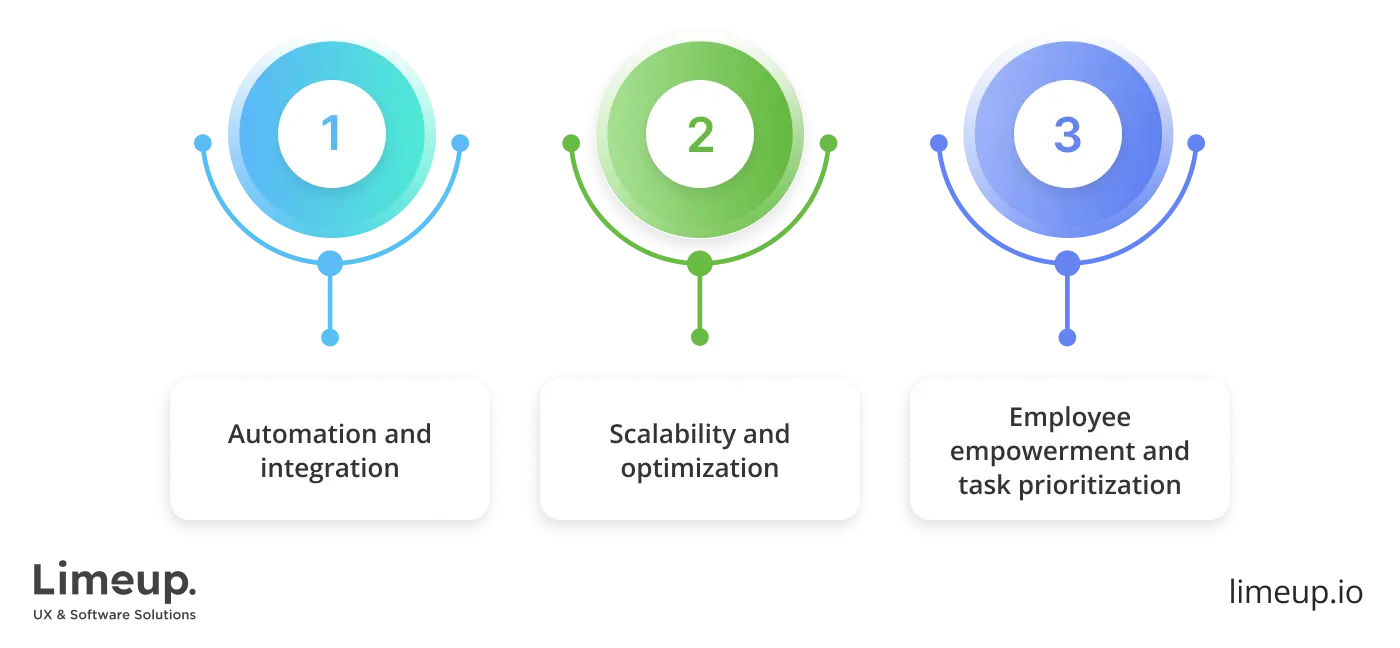
For instance, as one of the software development companies in London, we have been cooperating with an eCommerce institution that struggled with tracking inventory, being overwhelmed with spreadsheets that can be easily accessed by third-party people or even stolen. Moreover, workers who were responsible for this part indicated that 80% of work time is spent on manual tracking so they have to perform overtime.
The client applied for the development of ERP systems and received automatic updates for inventory so that team members received capabilities for managing more crucial tasks with improved conditions, breaks and motivation.
At this juncture, let’s jump right into developing such a program that can turn your premier idea into a real-world product.
How to develop an ERP system in 5 steps?
We would like to start with a statement, not to scare you but to prove that implementation of such a project is a complicated and ever-evolving task since almost half of projects may fail. However, 53% of companies indicated a positive ROI.
Is there a way to avoid failure? — yes, and investigating our experience in developing an ERP system, we will consider 5 crucial stages that take place when you decide to learn the nitty-gritty behind a theme’s cornerstone.
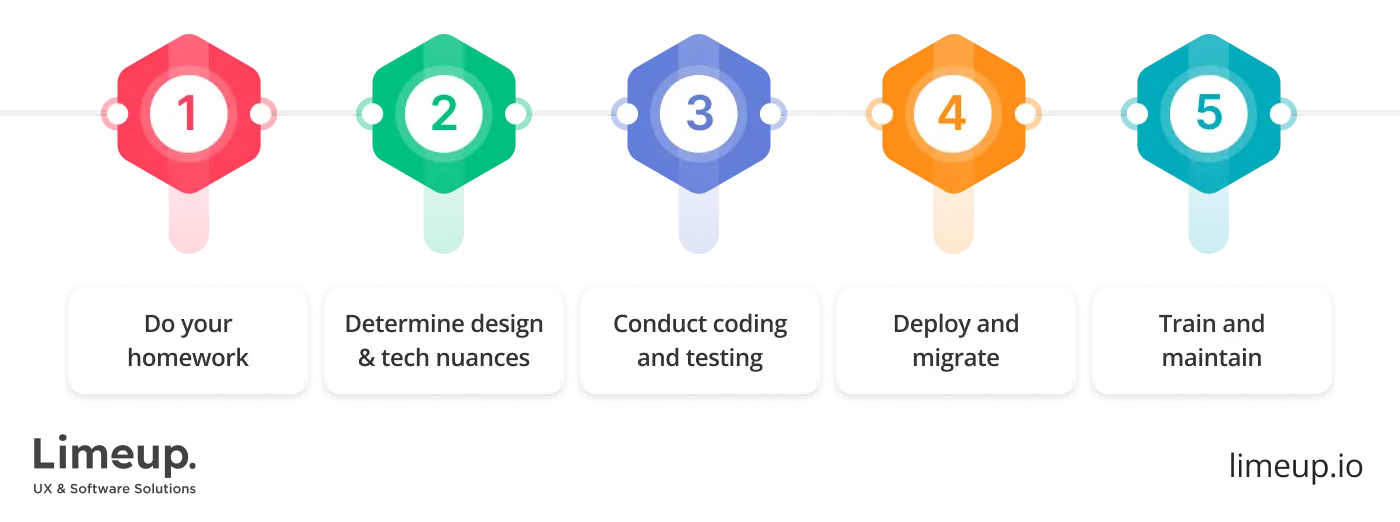
— Step 1. Do your homework.
It’s better to start with in-depth research of your purpose, standards, desired results because this tech journey may be the most challenging, and without having a map, you will barely recognize your destination even if you can go there.
As we always say to our partners, ERP is a far-away point on the global atlas and having an overall picture of where you would like to go is not enough for a safe trip, so you have to pack your bag with essentials — understanding of requirements.
The next step is to define which road will be the smoothest and least competitive, in other words, define your strategy and areas to be automated, what got to be considered across such a service, and more. For now, you will be ready to lay a base for your trip. We also recommend calculating potential risks and delays.
— Step 2. Determine design & tech nuances.
No way can you build it without a tech-savvy person, moreover, a team of tech gurus proficient in front-end and back-end, let’s say for ERP software development it’s Java, Python, My SQL database, various middleware tools, and more.
Considering design it’s better to highlight that end-users are your departments which must have to be able to use it without headache, so UX has to be based on their vision of a system that will be serviceable.
Therefore, focus on:
- user-centricity,
- intuitive approach,
- consistency,
- data visualization,
- accessibility through devices.
— Step 3. Conduct coding and testing.
Custom, or from scratch, creation is not a joke that’s why the first and second stages were about defining essential elements, for now you will practice tech stack and build the program of your dream with front-end and back-end technologies, as well as assess automation of the operations you have already indicated.
ERP in software development is also about possible errors from the building side since product issues can’t always be predicted so we recommend manual and automated testing, which can determine even some small mistakes like the button with a broken link or field for entering only numbers that accept letters, else.
Referring to the data we have outlined before, those enterprises that contacted a vendor reached an 85% success rate, so if you would like to ensure stress-free unit and hassle-free creation, it’s better to hire software developers.
— Step 4. Deploy and migrate.
Well, the second part of this phase is vital for corporations that have legacy data to transfer and prevent loss but let’s focus on the first one since launching is equal in stressing as setting in motion a ship since it evolves monitoring of possible issues, preventing them and immediate reaction to solve them.
To relocate information with the cream-of-the-crop practices, it’s better to set the priorities and do a backup of all the materials (ideally, you will also choose the most essential to prevent chaos with a well-thought-out strategy), validate completeness.
— Step 5. Train and maintain.
What a cool rhyme, right, and it signals that you are done with the toughest part of developing ERP software travel and have only to ensure that all the teams are capable of using your system using documentation that was created during previous stages. Also, it’s worth noting that you have to support this solution further by updating and solving bugs.
It looks like a long road, yes, we have been there, providing ventures with ERPs that enhanced not only the workflow but revenue streams, so such an investment is worth every penny, which will turn into two as time goes by.
You may also be wondering about what functions can be presented by a custom ERP software developer? We have got you covered with the material below, so stay tuned to learn more.
What are the key features of ERP system development?
Functions are defined according to your preferences and industry specifications, for example, managing finances for fintech and eCommerce companies where you are able to analyze and track incomes, revenue, losses, implement AI-powered tools for advanced insights, and more.
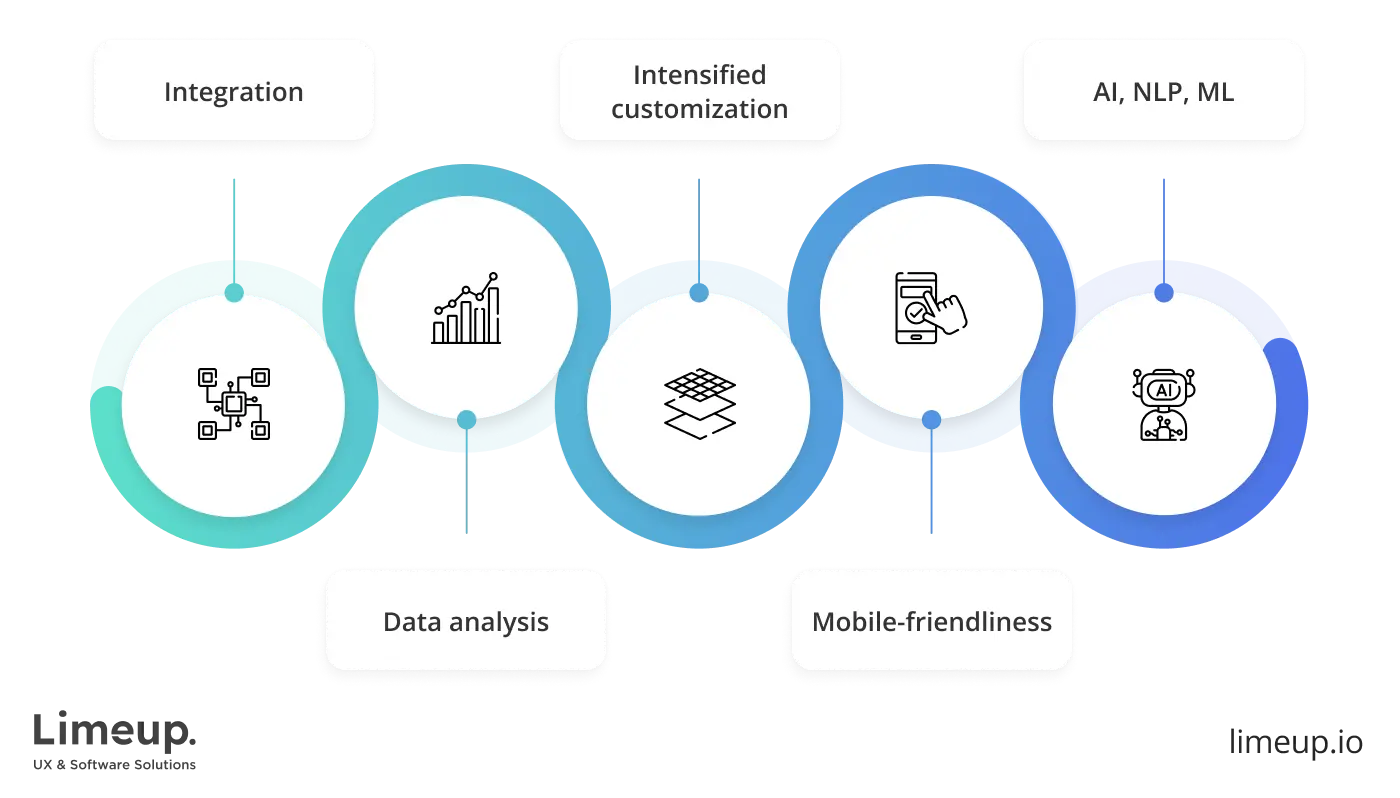
We will consider the most common ones that are crucial to our subject, “How to develop an ERP software?” So, let’s crush these points.
-
Integration. This attribute is the crux of the matter for every area, from manufacturing to healthcare and retail as integrated ERP is a golden ticket to new heights in competitive industries.
Based on our experience working with customers, we have implemented such systems to enhance patient records integrations for digital databases, optimized route planning and real time tracking, payrolls, CRM, supply management.
Well, that sounds like a lot of work and it is, we have named approximately 20% of capabilities that ERP software development brings to organizations in terms of interconnection.
-
Data analysis. “Fast-paced” is not even the proper word to describe our world, which changes at the time of lightspeed, so without rigorous and robust insights, you may make wrong decisions and lose money.
From performance online tracking to budgeting predictions and improvement suggestions, you are able to fine-tune your configuration for constant reports, issues, challenges in resolutions.
-
Intensified customization. Here we are talking about tailored ERPs not off-the-shelf ones that can’t adapt fully to your expectations and are limited to built-in functions that can’t always handle your growth, as well as they lack in integrations with third-party apps that are essential for smooth workflow.
Of course, referring to the first step in the how-to question, you will define the core basis and decide that the pre-made composition is fittable, it’s all up to you.
A made-to-order building ERP system is also about hearing workers’ ideas since they will deal with such a complex model.
-
Mobile-friendliness. The statistics of phone usage are insane, so ignoring it is not an option and we recommend considering an app that will provide access even within tablets. Your team members will be able to carry devices and not a PC or laptop, especially if they have responsibilities beyond the contractor’s office.
Another crucial moment stands for the fact that the Internet connection can go down but the work continues and the ability to enter data being offline is vital (the information will be synchronized when the connection is on).
-
AI, NLP, ML and other terrifying words that describe cutting-edge technologies that are gaining more attention in the cut-throat market, promising to flip the world with algorithms as Archimedes said, “Give me a place to stand, and I will move the Earth.”
You can implement them for chatbots, cloud solutions, automation tools, and more, all depending on what your purpose is for ERP software engineering.
We have outlined only 5 features and you may think, “Well, what about the rest of them?” Our advice is to refer to the process of building, especially the first two stages then decide on functions to be added additionally.
For example, running a fintech entity means you will desire sales management, investment monitoring, human resources if you have a large team of coders, researchers, analysts, and other employees.
Therefore, it’s all about your goals that define what oughts to be tracked and automated, we would like to note that balance has to be followed, especially across intuitive user interface, efficiency, accessibility, better security and more refinements.
How much does custom ERP software development cost?
Price estimation is the request we receive the most and we can tell that sometimes it’s like sweating bullets in a snowstorm but leaving you without an answer is not our style, afterward, we will investigate what impacts the final budget and average amount of $ you need to finish such a project. Let’s start with a short table that shows the difference between opposite solutions:
| Complexity | Average $ | Description |
| Elementary ERP | $40,000–$79,999 | Basic modules for sales, inventory, finances. |
| Mid-complex ERP | $80,000–$149,999 | More advanced features with integrations of third-party systems. |
| Complex ERP | $150,000–$500,000+ | No limits to customization, AI-powered tools, big data, or business intelligence. |
There are dozens of influencing factors that increase the expense, as you can see from the visualization above, modules are core priorities but we will consider other standpoints that are common for each establishment:
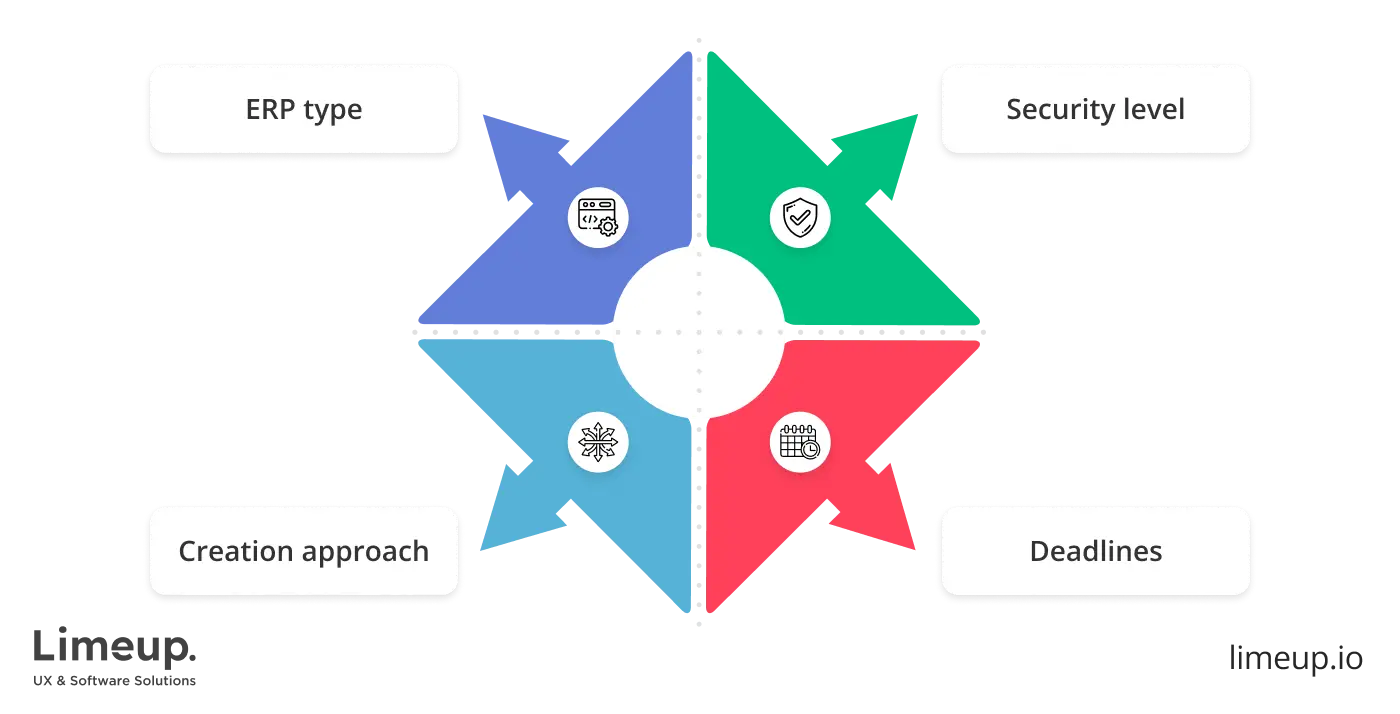
-
ERP type
The representative which stands for the opportunity to create an ERP system is about on-premise or local and cloud-based systems that involve various infrastructure nuances, initial rate, integrations, scalability, security and compliance moments.
Talking in examples, an initial amount of money for the second, cloud type, is lower since you don’t have to put hardware and maintain it, you pay to a provider who takes care of licensing fees, machinery, setup, maintenance and support. Moreover, you are able to make a monthly purchase as long as you want this solution and repudiate a contract.
-
Creation approach.
In the material above, we mentioned off-the-shelf ERPs , here we will consider the value aspect since such a development will estimate less due to limited customization, more risks, and a subscription-based model.
Custom ERPs are brand new with enhanced competitive benefits that allow you to complete work faster and improve productivity compared to your competitors. Considering software development cost , it requires longer timeframes and team of software architects.
One of the trending outlooks is called “low code and no code development,” and is attractive to agencies that would like to receive such a program faster, with lower outlay and with the usage of innovations, still, it has some cons that you can explore deciding to apply for these ERP software development services.
-
Security level.
This statement is connected to the first one as it encompasses the amount of sensitive data, regulations for fintech or healthcare niches (GDPR, HIPAA etc), information that has to be stored and processed securely. Namely you may want end-to-end encryption like TLS/SSL, with fees around $5,000–$50,000.
Moreover, here are some practices that are must-haves if you would like to protect your company from hackers, like:
- Multi-factor authentication (MFA) is about an extra layer of the login with the usage of password, biometrics, voice control, and more, and it costs ~$3,000–$14,000, according to an ERP software developer .
- Streamlined testing will prevent vulnerabilities, at least most of them that are well-known for security systems, and you will be charged $10,000 or more, depending on the scope of work.
-
Deadlines. After all the tech-related stuff we have reflected on, are we talking about this? — right because if you sign a contract with a vendor setting preferences of fast development, so that the tech hub entails delight in other projects, expect to pay more.
Typically, it demands almost 2 weeks for organization analysis and you call for short terms as the whole duration is about 40 weeks.
Such a tiring topic was explained with infographics based on our experience, so we hope for now you have an overall picture of how to create an ERP system when every penny matters.
As for the latest statistics we have found online and according to surveys made across our clients, over half of the firms indicated that ERP brought more benefits to their operation whatever it takes so this investment can become a game-changer for you.
How long does it take to develop ERP software?
Let us jump up with statistics from the one project we created — it took 8 months but can also encompass years if you have complex infrastructure and terabytes of data stored and around 4-8 months for small and mid-sized solutions.
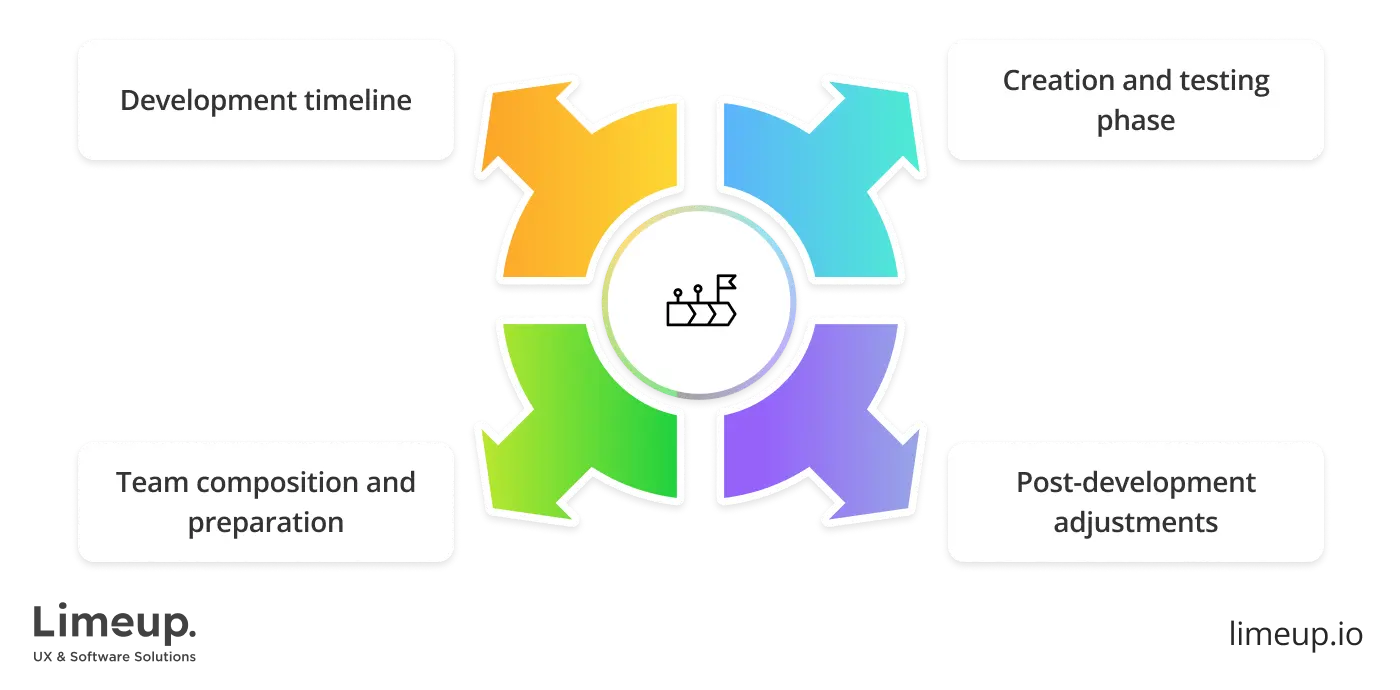
We have already mentioned all representatives that take part in the development so you definitely understand that this product can’t be built within a few days even by premier ERP software developers.
The largest part of time will be spent on actual creation and testing (we would like to note it since skipping this step can lead to more time delays), so going live is also about meeting all the preconditions, setting up the crew of programmers, for example, to hire dedicated developers, researchers, analysts, designers, QAs, project managers, and other tech-related workers.
Picturing custom ERP software development services means you have to investigate various aspects of the offers and choose the one that suits you according to the map you will create based on the first part of this article.
You can also include fine-tuning as part of cooperation, exploring ever-evolving demands, some issues, bugs and other unpredictable moments. Hopefully, for now you are armed with all the vital information about terms that will help you to plan the whole process.
To sum up
After familiarizing yourself with this guide, you will not meet the dead end of your tech journey, moreover, we have considered pricing, timelines so that you are ready to collaborate with a vendor who can take on the technology side of your project dedicated to software development of ERP.
Completing such a system on your own is sometimes like rowing against the tide since numerous stages and elements are included, from design to coding, market research, in-depth operations analytics, communication with employers who conduct manual tasks that would benefit from automation, and more.
Therefore, one of the most efficient ways to find the shortcut to the ready-made solution is partnering with a proficient provider who has reliable experience in developing ERPs for various purposes and niches. Contact us to manage the workflow, scope of tasks, niche specifications across regulations and terms, and other details.

